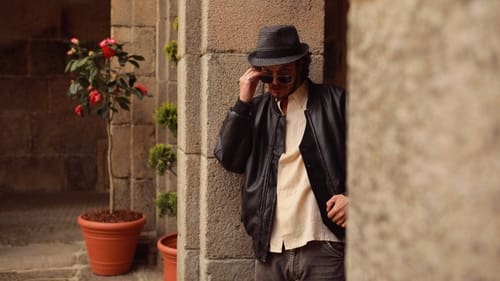Ângela Marques
Рождение : , Lisbon, Portugal

Maria das Dores

“1618” is a film about the inquisitorial visit to Porto that encountered resistance from priests, ordinary citizens and the city authorities themselves, all accustomed for centuries to living alongside the Jews.

Irmã Maria Áurea (Madre)
A nun is called upon to adopt her 15-year-old nephew, and as a consequence religious, familial and sensual love become entangled.

Maria das Dores
In a rural landscape, that resembles an old Portugal, an elderly man find out that his wife, whom he believed to be dead, was seen shopping in town. Spiteful and sad, he wants to hide from everyone, but his friends insist that he uses this situation to become stronger and try to get married again.

Sister Maria Caetano
The Nun's Kaddish is a short film that portrays a true story of inter-religious kindness when a Nun observes a Jewish ritual, raising the spirituality of the two faiths towards a higher ...

Rececionista
Молодой боксер из Кабо-Верде отправляется в Португалию, чтобы найти своего отца, бывшего чемпиона по боксу. Габриэль должен вступить в опасный боксерский поединок, чтобы попытаться его спасти.

In 2016, Edgar Pêra released The Amazing Spectator, a playful investigation into cinema’s disquieting essence that had everything from negative film images of boobs and positively splendid interviews to a donkey hand puppet. The film and an accompanying book formed his PhD thesis. But as so often with him, projects turn into obsessions – especially when there are masses of notions not pondered, thoughts not elaborated upon. And so KINORAMA - Beyond the Walls of Cinema was born, a stand-alone continuation of The Amazing Spectator that looks at cinema’s future in cyberspace and, accordingly, perhaps the end of its enslavement to figurative representation, the 'stupid sacred in narrative cinema' (to use a Pêra’ism), realism and artificiality in 3D cinema, and many other aspects.

Sister Maria Caetano
Великолепная и захватывающая историческая драма рассказывает историю евреев в Португалии начиная с 1496 года, когда король Мануэл I запретил исповедание иудаизма. По официальным данным еврейские общины страны исчезают, однако во многих деревнях продолжает практиковаться криптоиудаизм. Возвращаться в Португалию евреи начинают только в девятнадцатом веке с окончанием инквизиции. В Порто обосновывается небольшая община ашкеназов, к которой присоединяется принявший иудаизм офицер португальской армии; со временем он начинает путешествовать, пытаясь вернуть тех, кто тайно исповедует иудаизм, к открытому исповеданию религии.

Amélia
Главный герой фильма, казалось бы, счастливый человек, у которого есть дом, семья и работа. Однако родня его совершенно не ценит, а работа кажется мучением. Но одна внезапная встреча изменит его жизнь раз и навсегда…

Irmã Angelina

Mãe
“An old photograph taken 36 years ago. His hand rests on my shoulder. A blessing, a gift. Then a history of over four decades of friendship, admiration and apprenticeship. A journey into Oliveira’s cinema, his method, his way of filming and his extraordinary cinematic inventions. He lived for over a century, over a century of cinema, cinema in its entirety. For him, and for me too now, documentary and fiction films go hand in hand; it is all about cinema. So I had the audacity to film a magnificent story that Manoel loved but never filmed, one that he left behind as if his hand and eyes were close to God, or among the gods, and he was steering me.” - João Botelho

A kino-investigation about spectatorship, a continuous conversation between different kinds of spectators: which one is more cinema: Citizen Kane on a mobile phone or a football game projected in a cinema theatre? What is the cinema of uncertainty? How many kinds of amazement exist? Does fear and belief precede amazement? What are the rights and duties of the spectator? Is the essay film a manifesto against voyeurism? Should spectators be paid? What amazes the spectator of this day and age?

Fragments of light and shade in the lives of a truck driver spiraling downward, his caring wife and their oblivious daughter.

Menina Odete
I am the double of the shadow of my own image. An allegory that occupies my place. This is my act of contrition. Beyond good and evil, I stand as an equation: Its result cannot be manipulated By morals or ethics. In mathematics there is no place for beliefs Just as life and death Are a certain fate.

Senhora
Four people meet during a train trip up the Douro Valley.

Lena
Five low-life people find themselves trapped in a public toilet.

Мигель снял в баре девушку Лилу, предварительно напоив и накурив её, после чего привёз для секса в дом своего друга. Когда Мигель среди ночи ушёл, его место в постели с девушкой занял хозяин дома. Девушка проснувшись утром, ничего не помнит, кроме того, что приехала туда с Мигелем. Она знакомится с хозяином дома и снимает у него комнату. Постепенно они влюбляются друг в друга, но появляется большая проблема в этих отношениях - беременность Лилы. Она думает, что беременна от Мигеля, но её ждёт сюрприз.

A triptych of short stereoscopic films by Peter Greenaway, Jean-Luc Godard and Edgar Pêra. Includes "The Three Disasters" by Godard, "Cinesapiens" by Pêra and "Just in Time" by Greenaway.

Teresa

Eva

Woman
Based on the installation Santa Paz Domestica, Domesticada by Ana Vieira (1977) and excerpts from the September 22nd, 1956 issue of the magazine O Cruzeiro.

Free adaptation of Sophocles classic tragedy “King Oedipus” crossed with Jack Kerouac's classic “On the Road”. The starting point is the loss of identity of a generation of Portuguese emigrants. Tebas tells the story of a young man who, looking for his origins, departs from Paris to Portugal with a beatnik truck driver. The film is a voyage into the strange depths of Portugal in the form of surreal road-movie.

An act of passion, filmed in a church turned into a bar, on Easter 2003, and starring as many actors as the days of the year… Taking the sacred painting as a reference, the film questions the human condition: letting oneself die like Christ or betray scientifically like Peter?

Adoração
Having lost her place among the social elite, a widow remarries and starts a family.
















